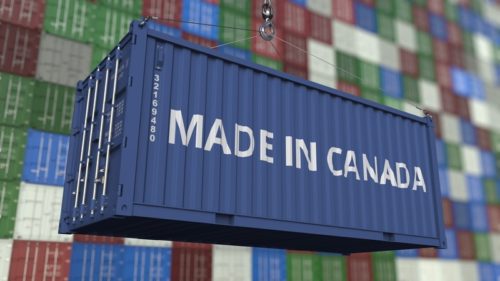Canadian Controlled Goods Program (CGP)
What is the Canadian Controlled Goods Program?
The Canadian Controlled Goods Program (CGP) controls the export of goods deemed to have military or national security significance under the Defense Production Act. The definition of “goods” includes components and technology regardless of where they are manufactured. The term “goods” also applies to defense articles that fall under the control of the International Trade in Arms Regulations (ITAR).
Why Was Canada’s Controlled Goods Program Created?
The United States instituted the ITAR in 1976. At this time Canada was the only nation to be exempt from requirements to license certain defense articles.
This exemption was revoked in 1999 by the U.S. State Department due to concerns of diversions of articles to criminals and terrorists. Because of this, The government of Canada agreed to a shared commitment to ensure the security of defense item transfers and re-transfers. This in turn led to the creation of the Canadian Defence Production Act and the Controlled Goods Regulations in 2001.

What is the Defence Production Act?
The Defence Production Act (PDA) is administered by the Minister of Public Works and General Services (PWGSC). The PDA serves three major functions:
- Empowering the Minister of the PWGSC to acquire defence supplies and services required by the Department of the National Defence.
- Providing regulation of access to controlled goods. This includes the Export Control List.
- Defining offenses and provides guidance for prosecution and sentencing for those offenses.
Who Does This Law Apply To?
The Controlled Good Program applies to anybody that examines, possesses or is involved in the transfer of controlled goods. These controlled items are defined Group 2 of the Export Control List, the Munitions List. This pertains to organizations and individuals. As a result, organizations and individuals that are involved with controlled goods must register with the Controlled Goods Directorate and comply with the Defense Production Act and Controlled Goods Regulations.
- Individuals must conduct business in Canada, be a citizen or permanent resident of Canada, and pass a security assessment to be eligible.
- Organizations must be incorporated or authorized under Canadian federal, provincial, or territorial law for eligibility.
Exemptions are available for visitors, temporary workers, and international students under specific provisions of the regulations. Security assessments are required for individuals who own over 20% of the involved business.
What are CGP Requirements
Registrants are subject to section 10 of the CGP. Some of these requirements include:
- Maintaining the accuracy of information in the registration form by reporting changes within 10 business days.
- Maintaining a record keeping system for controlled goods, security assessments, personnel, exempt individuals, and involvement of ITAR registrants.
- Designate an appropriate CGP officer for the organization.
- Establishment of a security plan.
- Establishment of a training program of all personnel.
- Notification of the Controlled Good Directorate in the event of data breaches.
- Provide security briefings to visitors.
- Make records available to the CGP.
- Report changes in security assessed individuals criminal history.
- Report any change in an application for exemption.
- Provide a list of security assessed employees to the CGP.
- Consider recommendations provided by the CGP for high-risk employees.
Appointing a Designated Official
As a requirement for registering in the Controlled Goods Program an organization must appoint a designated official. An appropriate candidate for this position should be able to conduct the legal responsibilities of the export program with responsibility and integrity.
The responsibilities of the designated official include the following:
- Carrying out all tasks in compliance with the Defence Production Act and the Controlled Goods Regulations.
- Performing all functions as listed in section 13 of the Controlled Goods Regulations.
- Completing the Designated Official Certification Program.
- Conducting security assessments of all organization directors, officials, and employees.
- Performing risk assessments of all transfers of controlled goods to persons or organizations who is not registered or is exempt from registration.
- Verifying the validity of received information involving temporary workers, international students, and visitors.
A security assessment application for the designated official must be submitted when registering for the CGP. If approved the security assessment is good for a period of five years and as long as the designated official is employed by the registered person or organization.
Legal Repercussions for Failure to Comply with CGP
Persons that fail to comply with regulations in the the Defence Production Act may have their registration suspended or revoked. Furthermore, they may face prosecution and face fines of up to 2 million dollars. They may also face imprisonment for up to 10 years.
CVG Strategy Export Expertise
Understanding the Canadian Controlled Goods Program and developing a viable compliance program is essential for persons or organizations that examine, possess, or transfer goods that fall under CGP jurisdiction. This can be challenging given the complexities of these regulations.
CVG Strategy has been helping our clients with their export compliance programs for over a decade. We can provide guidance in establishing and maintaining export compliance programs. We can also assist with product Export Control Classification Determination.
Our training programs are current, insightful, and engaging. They will ensure that your personnel is aware of the latest developments in export law. We can provide custom programs that incorporate ITAR, EAR, and Canadian Export Controls. Contact us for custom training or register for our regularly scheduled webinars.
Visit our ITAR store for signs, badges, and accessories to help you maintain a secure facility.
How Can We Help?
Take a look around our site and contact us for more information on how we can help you meet your challenges.
Latest News
Nicaragua Export Restrictions Increased by U.S.
Nicaragua export restrictions have been increased by both the Directorate of Defense Trade Controls (DDTC) and the Bureau of Industry and Security (BIS) as of


